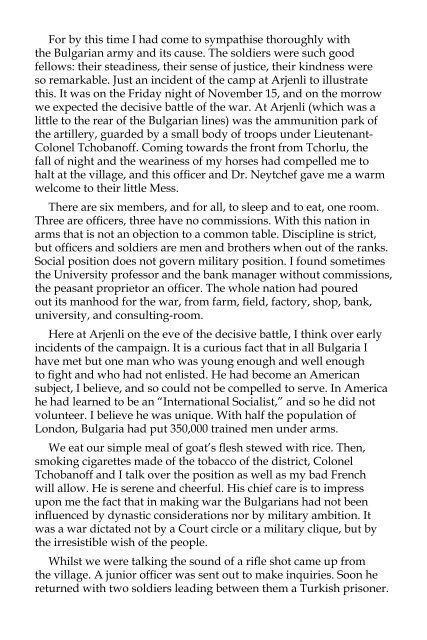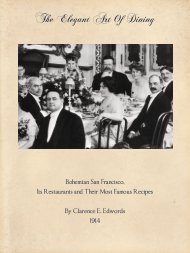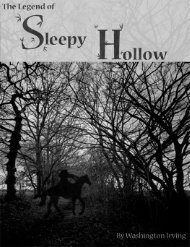Bulgaria e-book - iMedia
Bulgaria e-book - iMedia
Bulgaria e-book - iMedia
Create successful ePaper yourself
Turn your PDF publications into a flip-book with our unique Google optimized e-Paper software.
For by this time I had come to sympathise thoroughly with<br />
the <strong>Bulgaria</strong>n army and its cause. The soldiers were such good<br />
fellows: their steadiness, their sense of justice, their kindness were<br />
so remarkable. Just an incident of the camp at Arjenli to illustrate<br />
this. It was on the Friday night of November 15, and on the morrow<br />
we expected the decisive battle of the war. At Arjenli (which was a<br />
little to the rear of the <strong>Bulgaria</strong>n lines) was the ammunition park of<br />
the artillery, guarded by a small body of troops under Lieutenant-<br />
Colonel Tchobanoff. Coming towards the front from Tchorlu, the<br />
fall of night and the weariness of my horses had compelled me to<br />
halt at the village, and this officer and Dr. Neytchef gave me a warm<br />
welcome to their little Mess.<br />
There are six members, and for all, to sleep and to eat, one room.<br />
Three are officers, three have no commissions. With this nation in<br />
arms that is not an objection to a common table. Discipline is strict,<br />
but officers and soldiers are men and brothers when out of the ranks.<br />
Social position does not govern military position. I found sometimes<br />
the University professor and the bank manager without commissions,<br />
the peasant proprietor an officer. The whole nation had poured<br />
out its manhood for the war, from farm, field, factory, shop, bank,<br />
university, and consulting-room.<br />
Here at Arjenli on the eve of the decisive battle, I think over early<br />
incidents of the campaign. It is a curious fact that in all <strong>Bulgaria</strong> I<br />
have met but one man who was young enough and well enough<br />
to fight and who had not enlisted. He had become an American<br />
subject, I believe, and so could not be compelled to serve. In America<br />
he had learned to be an “International Socialist,” and so he did not<br />
volunteer. I believe he was unique. With half the population of<br />
London, <strong>Bulgaria</strong> had put 350,000 trained men under arms.<br />
We eat our simple meal of goat’s flesh stewed with rice. Then,<br />
smoking cigarettes made of the tobacco of the district, Colonel<br />
Tchobanoff and I talk over the position as well as my bad French<br />
will allow. He is serene and cheerful. His chief care is to impress<br />
upon me the fact that in making war the <strong>Bulgaria</strong>ns had not been<br />
influenced by dynastic considerations nor by military ambition. It<br />
was a war dictated not by a Court circle or a military clique, but by<br />
the irresistible wish of the people.<br />
Whilst we were talking the sound of a rifle shot came up from<br />
the village. A junior officer was sent out to make inquiries. Soon he<br />
returned with two soldiers leading between them a Turkish prisoner.<br />
I learn the facts. The Turk had tried to rush past a sentry standing<br />
guard over the ammunition park. The sentry had fired, had not<br />
hit the man, but had grappled with him afterwards and taken him<br />
prisoner.<br />
I nerved myself to see the Turk shot out of hand. The rules of<br />
war warranted it. He had tried to rush a sentry on guard over an<br />
important military station. But the <strong>Bulgaria</strong>n officers decided to hear<br />
his story, and a kind of informal court-martial was constituted. The<br />
proceedings, which were in Turkish, were translated to me, as I was<br />
acting in a way as friend of the accused to “see fair play.”<br />
The Turk’s story was clear enough. He had lived in Arjenli all his<br />
life and was not a soldier. When the Turkish army had evacuated the<br />
district he had not left with them, but had stayed in his old village.<br />
That night he had gone out of his hut to the village well. Returning, a<br />
sentry had challenged him, and he had become frightened and tried<br />
to run away.<br />
It was clear that the man was telling the truth. The <strong>Bulgaria</strong>ns<br />
believed him, and let him go with a warning. This showed justice and<br />
courage, and a good “nerve” too. In some armies, I suspect, the Turk<br />
would have been shot, or hanged first and left to explain afterwards,<br />
if he could. And this was among the <strong>Bulgaria</strong>ns, who some insist are<br />
a bloodthirsty, cut-throat race, with no sense of justice or of mercy!





